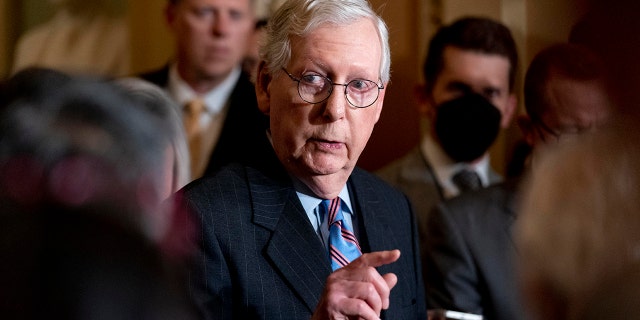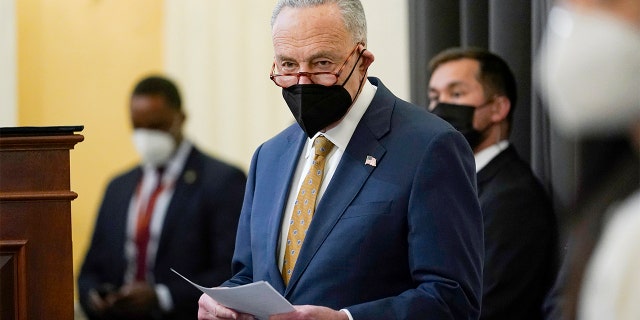Senate Majority Leader chuck-schumer” target=”_blank”>Chuck Schumer, D-N.Y., < filibuster of the bill. Schumer is also short on votes to alter Senate filibuster provisions. Therefore, Schumer doesn’t have the votes to pass the bills.
Those three things are the only certainties about the Senate over the next few days.
Schumer has just said that the Senate will take a vote related to voting rights and the filibuster sometime between now and Martin Luther King Day, Monday, January 17.

Mitch McConnell, Republican senator from Kentucky, and Senate Majority Leader Chuck Schumer, Democratic senator from New York, faceoff
It’s possible the Senate could be in session this weekend and, those key votes, could fall over the weekend.
So, let’s start with the possibilities:
Schumer attempted to bring up voting rights measures on a couple of occasions last year. Breaking a filibuster just to launch debate on a bill, and, closing debate on the underlying bill itself, requires 60 votes. Schumer has at least one or two of these “failed” procedural votes left over in his hip pocket. A failed procedural vote to end a filibuster (known as a cloture vote) is what Schumer needs if he tries to alter Senate procedures surrounding the filibuster. Or, Schumer could force the issue on a “motion to proceed” to call up one of the two voting bills Democrats are touting now. A failure to break the filibuster to start debate would give Schumer a third failed cloture vote with which to work to change filibuster provisions.
MCCONNELL THREATENS SENATE SHUTDOWN IF DEMOCRATS NUKE FILIBUSTER
Such a gambit is called “the nuclear option.”
Schumer and others have repeatedly referred to a prospective Senate “rules change” regarding the filibuster. Any move on the filibuster would be anything BUT a rules change. What Schumer and others are really talking about is establishing a new Senate precedent.
The Senate has 44 Standing rules. But one must first overcome a filibuster to make an actual change to those rules. And, the Senate currently requires 67 votes to end a filibuster on a rules change.
So, that’s not going to work.
However, the Senate conducts much of its business based on precedent. This is a voluminous set of parliamentary criteria based on previous Senate maneuvers. In short, if you struggle to change “the rules,” perhaps try to “establish a new precedent.”

Senate Minority Leader Mitch McConnell speaks to reporters after a Republican strategy meeting at the Capitol in Washington, Oct. 19, 2021.
(AP Photo/Andrew Harnik)
Democrats detonated Nuclear Option I when they held the majority in 2013. Democrats were frustrated with GOP filibusters of barack-obama” target=”_blank”>President Obama’s< R-Ky., used a similar approach for Nuclear Option II. McConnell specifically dropped the threshold to end filibusters on Supreme Court nominees from 60 to a simple majority.
What’s left intact is the 60 vote requirement to end filibusters related to legislation. Both voting rights bills are legislation, not nominations – as was applicable with Nuclear Options I, and II.
Let’s say Schumer tries to bring up one of the voting rights bills. He must file a “cloture petition” to proceed to the bill. By rule, cloture petitions require an “intervening day” before they are “ripe” for a vote. So, let’s say Schumer files cloture to end debate on the motion to proceed to one of the voting bills Wednesday. By rule, the Senate can’t actually take the cloture vote until Friday. Thursday serves as the “intervening day.” Thus the Senate would vote Friday to break the filibuster to start debate on the voting bill. If it fails to marshal 60 yeas, Schumer has the tool needs to go nuclear: a failed cloture vote.
This is where Schumer could trip the nuclear wire.
From a parliamentary standpoint, the Senate must find itself in a “non-debatable posture” in order to trigger the nuclear option. A failed cloture vote is such a non-debatable position. By rule, there is no other debate permitted. This parliamentary cul-de-sac is essential. It’s the only parliamentary locus where Schumer could initiate a nuclear option. In fact, Schumer is inhibited from going nuclear at another parliamentary point. But a failed cloture vote is a unique circumstance in the Senate – pulsing with parliamentary isotopes.
MCCONNELL FIRES BACK AT BIDEN’S ‘PROFOUNDLY UNPRESIDENTIAL’ SPEECH: ‘DELIBERATELY DIVISIVE’
If Schumer is using a “new” voting bill that failed to get 60 yeas, he must switch his vote to wind up on the “prevailing side” of the cloture vote. In other words, the Republicans won. The “nay” side (against ending the filibuster) won. By briefly siding with the GOP, Schumer is allowed to demand a re-vote on the same issue.
So, if this happens Schumer could immediately “enter” or make a “motion” to reconsider the vote. If it’s the former (“enter”), the next key vote may not happen right away. Perhaps even the next day. If it’s a “motion,” the key vote could happen soon – but it’s unclear how soon.
Regardless, Schumer will then have at some point the failed vote necessary to execute a nuclear option.

Senate Majority Leader Chuck Schumer waits to speak on Jan. 6, 2022, during an event to mark one year since the U.S. Capitol riot.
(AP Photo/Susan Walsh, Pool)
Schumer may not make a point of order that the Senate only needs a simple majority (51) votes to terminate debate and break filibusters related to voting rights. Whatever Democratic senator is presiding – or, kamala-harris” target=”_blank”>Vice President Harris<, D-W.Va., Kyrsten Sinema, D-Ariz., and others are reluctant to alter Senate precedent on the filibuster.
The question is whether or not Schumer will carry out an unsuccessful nuclear strike. Schumer is playing his cards close to his vest. Does McConnell really want to lose on the floor and have multiple Democratic senators on the record as voting against changing Senate precedent?
To be clear, that may be part of Schumer’s gambit. He gets Republicans on the record as blocking the bill and the precedent change. Schumer can then portray those GOPers as “obstructionist.” But Schumer also engages in some internecine warfare here. Left-wing groups will then turn up the heat on Democratic senators who oppose the gambit. The hope by progressives is that those moderate senators eventually change their position.
The other question is whether Schumer simply decides that a “failed cloture vote” in an effort to start to debate on a voting rights bill is THE vote he wants to emphasize. That could potentially short-circuit and abbreviate all of the machinations listed above. In other words, the Senate votes later this week or on Martin Luther King Day on Monday and that’s it.
CLICK HERE TO GET THE FOX NEWS APP
Unclear.
But, it’s also possible Schumer could tee up the key vote (in whatever form it takes) for Monday and hold the Senate in session throughout the weekend, burning clock. Republicans might not participate. The Democrats could just rail on the floor all weekend long.
 Iktodaypk Latest international news, sport and comment
Iktodaypk Latest international news, sport and comment






